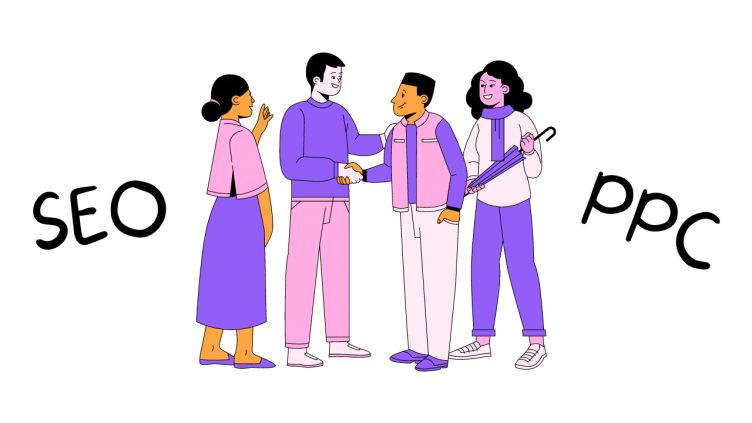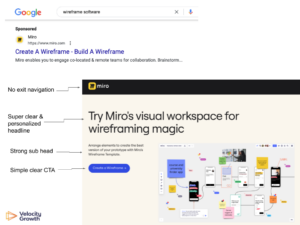By focusing on PPC and ignoring SEO, you won’t necessarily build a long term traffic stream for your business – once you stop paying for your ads, you are back to square one with zero visibility (and zero traffic).
The real SEM magic happens when your Paid Search and SEO activities are planned, coordinated and executed together as a single integrated strategy. This can be achieved by ensuring your internal teams work closely together; by hiring a single agency for both SEO and PPC; or by ensuring that your separate SEO and PPC agencies work together in the planning phase and check in regularly to share data and valuable insights.
Some of the benefits that can be achieved by approaching Paid Search and SEO from an integrated perspective include:
- Cost Efficiency
- Maximum Coverage
- Higher Trust / Authority
- Improved Click Through Rates
- Laser Focus
Cost Efficiency
One of the benefits of a joint approach and sharing of data between teams is the ability to keep costs down. You can ensure cost efficiency by bidding less on terms for which you’ve got a high organic CTR and Conversion rate.
Generally speaking these are terms for which you rank very well and for which the SERP is not too “busy” i.e. there aren’t many ads or rich snippets above the #1 organic results. If you can gain organic traffic from these terms without paying per click, then you should obviously do just that!
Maximum Coverage
By sharing data between teams, you can maximize your coverage on the SERP. This can be done by:
- Bidding on highly competitive terms which you don’t yet have the authority to rank for organically
- Creating content in order to rank organically for topics identified via Paid Search data
Bidding on Highly Competitive Organic Terms
When trying to rank for a search term / topic organically, you must ensure that your site includes a page that is laser focused on that topic (e.g. a product, a service or a customer pain point). If you mix two or more different topics on a single page it becomes incredibly difficult to optimize the page for all topics and ensure that it ranks in a high position for queries relevant to all those topics.
However, great content alone is not necessarily enough to rank organically for a topic, particularly if it is a highly competitive one. As well as the relevance of your content to a particular query, search engine algorithms also place a great deal of importance on the trustworthiness and authority of your content.
From the perspective of search engines like Google, you need to be seen as a trusted source – with sufficient links from other trusted websites, your site will be seen as trustworthy as well and search engines will rank your content higher in search results for relevant queries, where other ranking factors are held equal.
The problem is that it takes time to build your site’s link profile. While you’re working on a content and outreach strategy to build that link profile to the point that you eventually can compete organically, you can target those competitive terms with PPC ads.
Creating Content to Rank for Topics Identified via Paid Search
Outside of your core products and services, it can be difficult to know what types of content to create on your site. Keyword research can help with this. Keyword research involves:
- identifying keywords/topics from sources like your internal teams, your competitors’ sites and keyword research tools
- then prioritizing keywords/topics from this list about which you’ll plan to create content, with the aim of ranking organically for related searches.
Generally speaking the priority of a keyword/topic should be based on:
- Relevance: It should be relevant to your business offering
- Difficulty: It shouldn’t be too competitive for you to rank for based on your link profile vs that of your competitors
Search Volume: If users aren’t searching for a topic, then regardless of how good your content is, it’s unlikely to gain much traffic.
One difficulty with the keyword research process is that it can be very difficult to find accurate search volume data for search terms that you have identified as part of your keyword research.
Google Ads (Adwords) is the most trustworthy, accurate source of search volume data and even better, the “Search Terms” report can show you the specific terms that are driving impressions and clicks to your website. By keeping an eye on this report, you can identify new queries that you can respond to with great content.
Higher Trust / Authority
Really good content that provides value and answers user questions effectively is more likely to attract inbound links. However, if your site has a relatively poor link profile, it can be hard to get eyes on that content in the first place.
One part of the solution is to initially pay for traffic to that content via PR, Social Media Distribution and also PPC ads. These types of marketing should drive users to your content and improve the chances that other sites will link to it, thus boosting the organic rankings for both that specific piece of content and your site more generally.
Improved Click Through Rates
You’re probably already aware that paid Search ads look an awful lot like organic results.
A Paid Search ad is made up of:
- The Display URL
- The “headline”
- The “Ad Text”
An organic search result is made up of:
- The destination URL
- The Page Title
- The Meta Description
As you can see, from the perspective of the end user, the paid search “headline” and the organic search “page title” are often interchangeable. Plus, the paid search “ad text” and the organic search “meta description” perform the same function.
The difference is that while Google Ads allows you to test multiple headlines and ad copy options, in the case of organic search results, you can have just one page title and meta description at a given time.
You can use this to your advantage. By testing different combinations of ad headlines and ad copies in Google Ads, you can discover what works best and then employ that knowledge to help you create page titles and meta descriptions that will improve your organic click through rates.
Laser Focus
When it comes to keyword based Search Engine Marketing, you cannot focus on every single, possible, valuable search term at one time. Over the long term, you may have ambitions to answer as many of your target audience’s search queries as possible – but this requires a huge amount of effort i.e. writing and optimizing content, distributing content and building links, etc. Therefore, you will need to prioritize!
We’ve already mentioned means of prioritizing search terms for which you want to rank (i.e. Relevance, Difficulty and Volume), but by adding more Paid Search data into your calculations, you can be even more granular with your prioritization and ensure that your focus is on search terms that not only drive traffic but drive conversions as well.
If you have the data available to you from Google Ads, you should ensure that you prioritize content creation and optimization for search terms that not only hit the sweet spot for relevance, difficulty and volume, but that also result in higher conversion rates and ROI

Darren McManus is an accomplished SEO Lead at Velocity Growth, a leading digital marketing agency. With over seven years of experience working agency-side, Darren has established himself as an expert in the field of SEO. Based in Galway, Ireland, he has developed bespoke SEO roadmaps and implemented long-term, award-winning SEO strategies for clients spanning various industries.
Darren possesses in-depth knowledge and experience across all areas of SEO, including technical optimization, on-site optimization, and off-site optimization. His comprehensive understanding of search engine optimization techniques enables him to craft effective strategies that significantly enhance organic visibility, drive website traffic, and generate conversions for his clients.
His expertise in SEO has been instrumental in helping his clients achieve their digital marketing goals and grow their businesses online. His track record of success demonstrates his ability to deliver tangible results in highly competitive markets.






